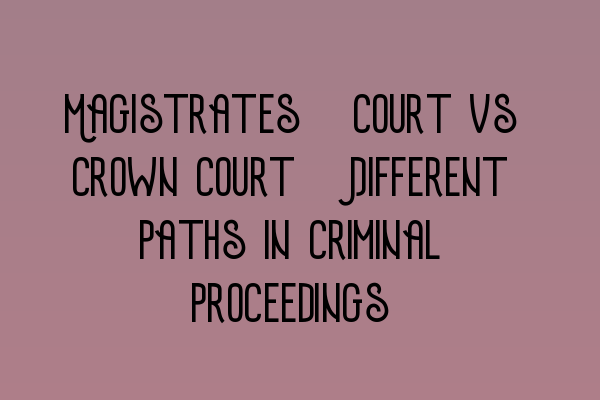Magistrates’ Court vs Crown Court: Different Paths in Criminal Proceedings
Welcome to our blog post where we explore the differences between Magistrates’ Court and Crown Court proceedings in the criminal justice system. Understanding these two courts is essential for aspiring solicitors preparing for the SQE Exam, as well as for individuals interested in the legal field. Let’s dive in!
Magistrates’ Court: The Initial Stage
The Magistrates’ Court is often the first port of call in criminal proceedings. It deals with less serious criminal offenses, also known as summary offenses. Examples include minor assaults, drunk driving, and low-level theft.
Magistrates’ Court hearings do not involve a jury. Instead, a panel of magistrates, who are typically volunteers with legal training, will preside over the case. They are assisted by a legal advisor who provides guidance on points of law.
These courts have limited sentencing powers, usually with a maximum custodial sentence of six months for a single offense. For more serious cases, they have the authority to send the matter to the Crown Court for trial.
Crown Court: Trials and Sentencing
The Crown Court is the venue for more serious criminal cases. These cases may be transferred from the Magistrates’ Court or initiated directly in the Crown Court. Offenses such as murder, rape, and armed robbery are typically heard in the Crown Court.
Unlike the Magistrates’ Court, the Crown Court involves a jury consisting of 12 members of the public. The presiding judge is responsible for ensuring that the trial is conducted fairly and according to the law.
The Crown Court has the power to impose longer sentences, including life imprisonment, for serious offenses. It also handles appeals from the Magistrates’ Court regarding conviction or sentence.
When Should a Case be Heard in Magistrates’ Court or Crown Court?
Determining whether a case should be heard in the Magistrates’ Court or Crown Court depends on the severity and complexity of the offense. The Magistrates’ Court typically deals with cases that can be resolved relatively quickly and do not require a jury.
If the case is deemed too serious, it will be sent to the Crown Court, where a jury trial can be held. Additionally, if the defendant chooses to have their case heard at the Crown Court, they have the right to do so.
It is important to note that the decision to send a case to the Crown Court lies with the Magistrates’ Court. Factors such as the nature of the offense, the criminal history of the defendant, and the potential sentence will be considered when making this determination.
If you want to learn more about becoming a solicitor and preparing for the SQE Exam, check out our related articles:
- SQE Exam Prep: Essential Study Materials for Aspiring Solicitors
- Demystifying the Solicitors Qualifying Examination Format
- SQE Exam for International Lawyers: Challenges and Success Strategies
- LLC Formation Made Simple: Step-by-Step Guide for UK Entrepreneurs
- LLC Formation: A Step-by-Step Guide for UK Entrepreneurs
We hope this article has shed light on the differences between Magistrates’ Court and Crown Court proceedings. Understanding the roles and powers of these courts is crucial for anyone interested in criminal law. If you have any questions or would like further information, please don’t hesitate to reach out to us at SQE Criminal Law & Practice Law UK.
